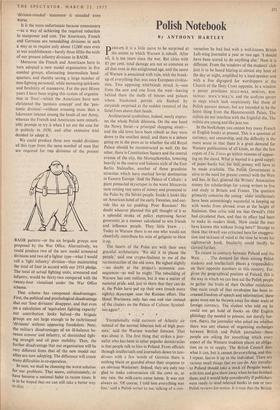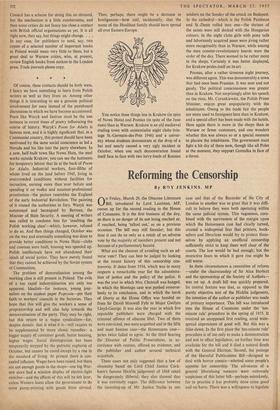Polish Notebook
By ANTHONY HARTLEY nERHAPS it is a little naive to be surprised at r the extent to which Warsaw is rebuilt. After all, it is ten years since the war. But cities with 85 per cent. total damage are not so common as all that even in this enlightened age, and the name of Warsaw is associated with ruin, with the break- up of everything that was once European civilisa- tion. Two opposing whirlwinds struck it—one from the east and one from the west—leaving behind them the shells of houses and palaces whose blackened portals are flanked by caryatids surprised at the sudden removal of the lintel from above their heads.
Architectural symbolism, indeed, neatly expres- ses the whole Polish dilemma. On the one hand the Nowy Swiat—a principal shopping street— and the old town have been rebuilt as they were down to the smallest detail, and there is a debate going on in the press as to whether the old Royal Palace should be reconstructed as well. On the other, there is Constitution Square and the central avenue of the city, the Marszalkovvska, towering heavily in the coarse and hideous style of the East Berlin Stalinallee, another of those grandoise atrocities which have marked Soviet domination in Eastern Europe. And the Palace of Culture : a giant pinnacled skyscraper in the worst Muscovite taste costing vast sums of money and presented to the Poles by the Soviet people. Inside it looks like an American hotel of the early Twenties, and out- side like an ice pudding. Poor Russians! No doubt whoever planned this gift thought of it as a splendid stroke of policy expressing Soviet generosity jn a manner calculated to win friends and influence people. They little knew. . . . Today in Warsaw there is no one who would not cheerfully contribute his mite of gelignite to blow it up.
The hearts of the Poles are with their own graceful architecture. 'We did it to please the people,' said one crypto-Stalinist to me of the reconstruction of the old town. He sighed slightly —no doubt at the project's economic con- sequences—as well he might. The rebuilding of Warsaw has cost millions, but it was a matter of national pride, and, just to show that they can do it, the Poles have pul up their own (much more sightly) skyscraper near the Russian effort. The Hotel. Warszawa, only has one .red star instead• of the clusters on the Palace of Culture. Symbol- ism again?
`Exceptionally mild .currents of Atlantic air instead of the normal Siberian belt of high pres- sure,' said the Warsaw weathei. forecast. That was about it. The first thing that strikes a jour- nalist who has been in other popular democracies is that people talk to him in Poland. From officials through intellectuals and journalists down to taxi- drivers with a few words of German there is nothing blank or guarded about their response to an obvious Westerner. Indeed, they are only too glad to make conversation till the cows or, at any rate, the milk-carts come home. It was not always so. 'Of course, I told him everything was fine,' said a Polish writer to me, talking of a con- versation he had had with a well-known British Left-wing journalist a year or two ago. 'I should have been scared to do anything else.' Now it is different. From the windows of the students' club jazz is to be heard blaring at almost any hour of the day or night, amplified by a loud-speaker and with a fine disregard for worshippers at the Church of the Holy Cross opposite. In a window a poster proclaims JELLY-ROLL MORTON, BOB- SKIEGO : ROCK'N ROLL'N, and the acolytes cavort in steps which look suspiciously like those of Polish peasant dances, but are intended to be the latest thing from the Hammersmith Palais. The militia do not interfere with the frightful din. The militia are young and like jazz too.
In the bookshops you cannot buy many French or English books at present. This is a question of currency, not censorship, and the difficulty is the more acute in that there is a great demand for Western publications of all kinds, so that the few copies of The .Times go within minutes of appear- ing on the stand. What is wanted is a good supply of paper-backs but, for this, money will have to be made available. The Polish Government is alive to the need for greater contact with the West and has, in fact, granted the Writers' Association money for scholarships for young writers to live and study in Britain and France. The question primarily concerns the young: older intellectuals have been astonishingly successful in keeping up with works from abroad, even at the height of Stalinism. ,One critic told me that Orwell's 1984 had circulated then, and that its effect had been to make its readers think, 'How could the man have known this without living here?' Strange to think that Orwell was criticised here for exaggera- tion and sickness of mind at the time he wrote his nightmarish book. Insularity could hardly be carried further.
To return to contacts between Poland and the West. . . . The demand for them among Polish students and intellectuals places a responsibility on their opposite numbers in this country. For, given the geographical position of Poland, this is the way in which we can best aid the Polish people to gather the fruits of their October revolution. One main result of that revolution has been in- creased freedom of speech and information; these gains must not be thrown away for sheer want of foreign currency. The student who told me he could not get hold of books on Old English philology (he needed to possess, not merely bor- row, them), the journalist who asked me whether there was any chance of organising exchanges between British and Polish journalists—these people are asking for something which every aspect of the Western tradition places an obliga- tion on us to supply. The British Council does what it can, but it cannot do 'everything, and this, 1 repeat, leaves it up to the individual. There are various small things that we can do. Any traveller to Poland should take a stock of Penguin books twhiet nhi ai n nIda it dwgoi vu el dt help awayi dwehr he nb ihyeifh apsu fib isshheerds were ready to send selected books to one or two Polish reviews for notice. It is true that the British Council has a scheme for doing this on demand, but the mechanism is a little cumbersome, and then some critics do not fancy too close a contact with British official organisations as yet. It is all right now, they say, but things might change. . . . In any case, for publishers to send, say, two copies of a selected number of important books to Poland would mean very little to them, but a great deal to Warsaw critics, who, at present, review English books from notices in the London press. Trade journals please copy.
Of course, these contacts should be both ways. I fancy we have something to learn from Polish writers as well as they from us. Among other [hings it is interesting to see a genuine political involvement for once instead of the pasteboard discussions to which we have become accustomed. Poets like Wazyk and Jastrun must be the one Instance in recent times of poetry influencing the :ourse of history. Wazyk's Poem for Adults is famous now, and it is highly significant that, in a Thmmunist country, this protest should have been motivated by the same social conscience as led a geruda and his like into the party elsewhere. In new, half-built town like Nowa Huta, the steel works outside Krakow, you can see the hutments for temporary labour that lie at the back of Poem For Adults. Industrial workers, four-fifths of whom lived on the land before 1945, living in wercrowded "conditions without facilities for -ecreation, earning more than 'ever before and ;pending it on vodka and amateur-professional rostitution—the picture resembles the England )f the early Industrial Revolution. The painting )f it roused the authorities to fury. Wazyk was summoned and harangued by Berman, the vlinister of State Security. A meeting of writers was called to condemn him for 'insulting the 'olish working class'—which, however, refused o do so. And then things changed, October was on the way and eventually something was done to provide better conditions in Nowa Huta—clubs and cinemas were built, housing was speeded up. Polish intellectuals have not abandoned their ideals of social justice. They have merely found hat they cannot be achieved by the Soviet system )f Communism.
The problem of demoralisation among the working class is still present in Poland. The evils of a too rapid industrialisation are only too apparent. Idealists—for instance, young jour- nalists on the student paper Poprostu—pin their faith to workers' councils in the factories. They hope that this will give the workers a sense of proprietorship and will also help towards the democratisation of the party. They may be right, but this return to a vague syndicalism—for, despite denials. that is what it is—will require to be supplemented by more classic remedies : a bigger supply of consumer goods, better housing, higher wages. Social disintegration has been temporarily stopped by the patriotic euphoria of October, but cannot be cured except by a rise in the standard of living. At present there is con- cealed inflation. Wages have been raised, but there are not enough goods in the shops—one big War- saw store had a window display of electric-light switches—and the effects of this will be felt later, unless Western loans allow the government to do some pump-priming with goods from abroad. Then, perhaps, there might he a decrease in hooliganism—how odd, incidentally, that the name of the Houlihan family should have spread all over Eastern Europe.
You notice these things less in Krakow (in spite of Nowa Huta) and Poznan (in spite of the June riots) than in Warsaw. Krakow is an old mediaeval trading town with existentialist night clubs (vin- tage St.-Germain-des-Pres 1946) and a univer- sity whose students demonstrate at the drop of a hat and nearly caused a very ugly incident in October, when one such demonstration found itself face to face with two lorry-loads of Russian soldiers on the Sunday of the attack on Budapest. In the cathedral—which is the Polish Pantheon and St.-Denis rolled into one—the shrines of the saints were still decked with the Hungarian colours. In the night clubs girls with pony tails and laboriously acquired jeans were jiving rather more recognisably than in Warsaw, while among the men counter-revolutionary beards were the order of the day. There seemed to be rather more in the shops. Certainly it was better displayed, for Krakow prides itself on its art.
Poznan, after a rather tiresome night journey, was different again. This was demonstrably a town that had once been Prussian. It was neat and not gaudy. The political consciousness was greater than in Krakow. Not surprisingly after his speech on the riots, Mr. Cyrankiewicz, the Polish Prime Minister, enjoys great unpopularity with the inhabitants. Owing to the trade fair the people are more used to foreigners here than in Krakow, and a special effort has been made with the hotels. Here again there is more in the shops than in Warsaw or fewer customers, and one wonders whether this was always so or a special measure to placate the inhabitants. The government must fight a bit shy of them now, though like all Poles at the moment, they support Gomulka in face of a threat.



































 Previous page
Previous page